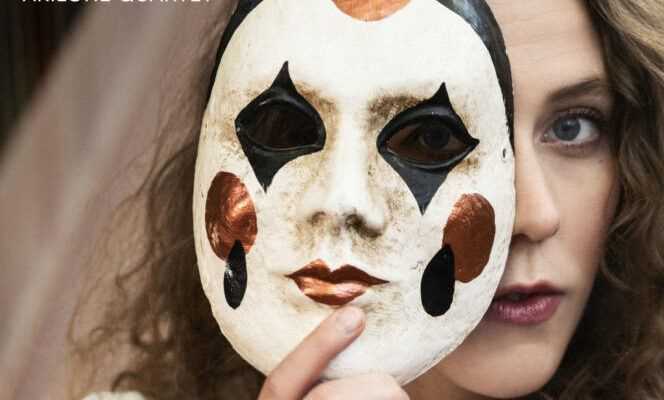Henriette Renié: Legend, Dance of the elves. André Caplet: Fantastic tale. Franz Liszt: The Nightingale. Benjamin Attahir: From the darkness II. Marcel Tournier: Féerie, The Eternal dreamer. Coline Jaget (harp), Lorraine Campet (double bass), Akilone Quartet.
Imbued with a quivering virtuosity and inspired by supernatural stories (from Edgar Poe to Leconte de Lisle), this program dedicated to the harp demands fairy fingers. If Coline Jaget satisfies this condition, she has many other assets to make each performance an appearance. Theatrical and choreographic for the elves and elves seen with Henriette Renié in the 1900s or almost cinematographic for the famous Fantastic tale (1923) by André Caplet that the young musician recreates in a bewitching body-to-body with the Akilone quartet. Whether they come from conventional imagery (Marcel Tournier) or sophisticated symbolism (Benjamin Attahir), the various legends gathered on this disc benefit from the fabulous investment of the soloist. Pierre Gervasoni
1 CD Evidence Classics/ PIAS.
The three young people of the Metral siblings, Joseph (violin), Justine (cello) and Victor (piano), winners in 2017 of the Haydn Competition in Vienna stood out with a first recording dedicated to Mendelssohn released in 2019 by Aparté. Here they are together, this time for a first album published by La Dolce Volta. On the program, the two piano trios by Shostakovich. A youthful music imprinted, for Opus 8, of a very ironic second degree, whose three brothers and sisters take up the glove with a salubrious alacrity. Same dramaturgical intelligence for the Trio n ° 2, a masterpiece whose tragic inspiration was bitterly drunk in the crucible of war and mourning. The final masterful dance of death will sound like the end of the world of an implacable and overwhelming humanity. Qualities that irrigate beauty Trio with piano by Weinberg, a sharply-edged, poignant and wild score, in the wake of Shostakovich, which the Metral – enthusiasm, demand, expressiveness – serve with the rigor and talent of which has established itself as the new young guard of music French room. Marie-Aude Roux
1 CD La Dolce Volta / Harmonia Mundi.
From his album Joy (2019), Sophie Alour received the Django-Reinhardt Prize and publishes Enjoy. Of Joy at Enjoy, Lacanian slip, the saxophonist imposes with the same grace these mixtures of East in West, percussions and voice, polyphony of the depths. Abdallah Abozekry (saz and song) takes the place of Mohammed, his brother (oud), who is heard in Joy. The coherence of the whole responds point by point to its first theme, The Giant’s Causeway: 6 minutes 17 volcanic, blowing pyrotechnics, frenzy. The challenge (mixtures, harmonic risks) is obviously taken up by the rhythm, Donald Kontomanou (drums), Damien Argentieri (piano) and his pivot, Philippe Aerts (double bass). We can also say, without fear of denial, that this challenge responds to the desired conception (she has the means) of Sophie Alour. Nothing of this album, one of the most astonishing, would be simply possible without the invisible which carries it: circulation of the unconscious, response accepted without submission but out of love, imperious authority in all flexibility. Attention, masterpiece, monument of preparation – we know it with the outbursts and ruptures, the stylish way of finishing, too – which makes the impossible possible. Francis Marmande
You have 38.45% of this article to read. The rest is for subscribers only.
